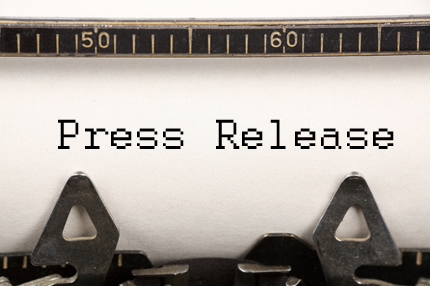It is the reporter’s job to look for newsworthy items. By providing a good press release you are helping the press to do their job while making money for your own company. The media needs your press releases just as much as you need publicity.
Top Eleven Tips for a Successful Submission
- Keep the length a maximum of one page or 400 words.
- Always write your press release in third person. Any first person commentary, such as testimonials or product reviews should only be in a quote with the source listed.
- Begin your press release with a short description of the news and then provide the details about the company who announced the news. Do not do this the other way around.
- Be careful to base your press release on facts. Report the facts about your product or service without fluff or hype. Let the reporter decide from the facts that your business is special and newsworthy.
- Use timely and new information related to current events. Do not write about something old or well known.
- When writing, remember who your audience is. Your audience is not your customers. Your audience is the journalists and editors.
- Make your release new, different, and interesting.
- Do not tell everything. Your purpose should be to provide enough information to generate interest and a follow-up from a reporter.
- Provide as much contact information as possible: contact name, address, phone, fax, email, website address, etc.
- Proofread your press release over and over. Do not trust your spell check software to do this for you. Have several individuals check your release before submitting it.
- You should have a link to your press releases at your website. Media may often come to your website and pick up an old story rather than the new story that drew them there in the first place. Also, the text helps with search engine placement because it provides good food for the search engine spiders.

SAMPLE TEMPLATE
Below is an example of the basics of a press release.
FOR IMMEDIATE RELEASE:
Headline
City, State – Date – Summary of what the release is about, two to three lines long.
Photo Here (optional)
Lead paragraph – Answer who, what, where, when, how and why
Text -The main body where your message should fully develop.
Corporate summary – Information about your organization, products or services to help establish your expertise.
Contact:
Contact Person
Company Name
Telephone Number
Fax Number
Email Address
Web site address
POWERFUL WRITING
Be First
Get your story to the media before your competitors. Keep in mind when writing your release that it is always best to be first.Be Unique
Your press release must be unique in order to stand out from hundreds of others. Always look for the unique aspects about your business and write about these first. Ask yourself, “What will catch the readers’ attention?”Be Focused
In order to be successful you must have a clear focus before you start writing. What is the news and how can it benefit the reader and encourage them to take immediate action? The more focused and newsworthy releases are more likely to be published. A press release that contains a clear newsworthy focus or angle stands a much better chance of being read and picked up by the media.Be Persistent
Sending just one press release is not very likely to bring you a large amount of publicity. You must approach the press with the concept of providing a solution to their readers problems. Let them know that you are the expert on this valuable information. Send that message repeatedly with different stories or news over a period of time and you will be successful.Have a Strong Hook
The “hook” is the who, what, when, where, how, and why found in the first or opening paragraph. The hook must be a strong and concise summary of what your release is about. The hook is a critical element to your success. You must let the editor or reporter know why your news is important to their readers.Have an Unforgettable Headline
It is essential that your headline be attention grabbing and unforgettable. The editor must know that what you have to say is important to their readers by reading the headline. Start your search for a good headline by reading headlines of news similar to yours found in newspapers and magazines.Powerful headlines have the following characteristics:
- They arouse curiosity.
- They pull you into the story.
- They create emotional appeal.
- They make the reader stop what they’re doing to read more.
- They promise answers to a question or solutions to a problem.
- They promise to reveal a secret or hard to find information.
PRESS RELEASE IDEAS
The opportunities for free publicity are endless. How many of the items below can you write about? For the best media attention, you should distribute a press release every week on one of the subjects below.
- Ask yourself what readers or a reporter will be interested in.
- Do you offer an apprenticeship or internship?
- Can you take part in a controversy?
- Can you write about a customer’s success story?
- Is there something new or unique about your company or organization?
- Can you release a testimonial received from a customer?
- Can you publish results of a poll or survey?
- Are you sponsoring a program or event?
- Do you offer free advice?
- Are there any unusual products or services that you offer?
- Can you publish a summary of useful or new facts?
- Has one of your customers received an award?
- Have you been involved in legislation?
- Do you have a unique projection or forecast?
- Do you have a new trademark?
- Are you launching a web site?
- Is there an issue you can protest?
- Do you have a new publication?
- Are you introducing a new product or service?
- Are you making a major change to your products or services?
- Have you been mentioned in a book or article?
- Have you become a member of an association?
- Are you making a change in pricing –especially reductions?
- Are you offering a new training program for employees?
- Are you opening a new physical or virtual branch location?
- Are you involved with fundraising or other events?
- Are you speaking at a conference or seminar?
- Are you celebrating a company anniversary?
- Do you know a way for people to save time or money?
- Can you write a letter to the editor?
- Are you holding a seminar or lecture?
- Has one of your offices moved or expanded?
- Are you having a half price sale?
- Have you Completed a study or research project?
- Has one of your employees won an award?
- Is some kind of special event happening for your company?
- Are you attending or hosting a trade show or exhibition?
- Have you had a visit by a celebrity?
- Do you have a unique way of selling or producing your product or service?
- Can you work with the media on a joint project?
- Have you obtained a new client or large new customer?
- Do you have a unique product or service?
- Can you adapt a national survey or report to explain your own company’s news?
- Have you received significant recognition in your field?
- Have you discovered a new use for your product or service?
- Are you running for office?
- Are you holding a competition or contest?
- Do you have news that could affect people’s health or make life easier?
- Are you giving away free samples or demo accounts, etc?
- Can you write a tie-in with a current news event?
- Are you involved with civic activities?
- Have you spoken in front of a noteworthy audience?
- Are you offering a reprint of a speech?
- Do you have a great testimonial to tell?
- Have you published a report or any kind of useful or new information?
- Have you testified as an expert witness?
- Have you won a new contract?
- Can you make a timely analysis or prediction?
- Is someone on your staff receiving a promotion?
- Do you have any community value that you can tell about?
- Have you had an interview or meeting with a celebrity?
- Can you hold an event to tie with a holiday or special occasion?
- Do you have an employee that is retiring?
- Have you won an award, contest or special certification?
- Is your company involved in any charitable or community actions that has an upcoming event?
THINGS TO AVOID when Writing a Press Release
The most common mistake is making your release sound like an ad and not news. We understand that your primary goal is to sell a product or service or bring attention to your organization, but you must provide news or valuable information or your release will be ignored by the press.Top ten things to Avoid
- Avoid sending a release with no real news. News is what happens that is different, new or unique. Otherwise it is not news.
- Avoid using technical language that your audience will not understand. Your press release should be easily understood by the lay person.
- Avoid fluff and words or phrases that make your press release sound like a advertisement or excessive self promotion. Be careful not to mislead or overstate. Only use words like exciting or fantastic to describe things other than your product or business. Let journalists come to their own conclusion that your product is amazing based on the facts that you have presented.
- Avoid commenting on or providing news that is old and no longer news.
- Avoid writing more than one or a maximum of two pages.
- Avoid providing insufficient or wrong information. It is very important that your release is Complete, accurate and specific. If you are having an event make sure you include all necessary dates. If it is an ongoing event, let people know.
- Avoid sending your release too late. Your release must be sent at least two weeks before an event for newspapers. Send releases at least four months in advance for major magazines.
- Avoid omitting a contact name, address, phone number, email address, and web site URL. You must let editors know who to call if they have questions.
- Avoid subjects or headlines that are boring or confusing. Editors must be able to figure out from the headline why readers should care about what you have to say. Look at the headlines in magazines and newspapers to get ideas.
- Avoid press releases that are obviously prejudiced or are negative about another person or company. Even if you have all the facts and evidence to support your negative claim against another, it is still a bad idea. This type of letter belongs in the editorial section of a newspaper and not in a press release.





















